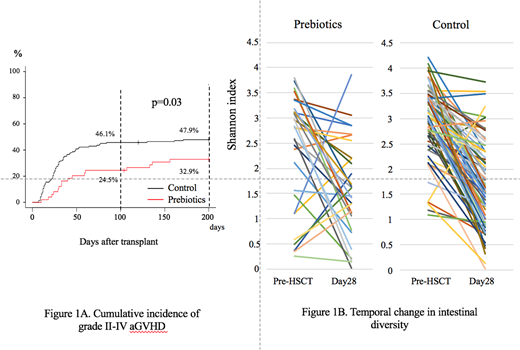Abstract
Introduction
Although allogeneic hematopoietic stem cell transplantation (allo-HSCT) is a potentially curable treatment for various hematological malignancies, some serious comorbidities are still problematic, and acute graft-versus-host disease (aGVHD) is a major cause of morbidity and mortality. The gut microbiota and its metabolites have been reported to play pivotal roles in both intestinal inflammation and the immune system. Also in allo-HSCT, it is increasingly evident that imbalance in the gut microbiota (dysbiosis) related to the development of aGVHD. Short chain fatty acids (SCFAs), which are produced as fermentation products by gut microbiota, are among the most studied metabolites. Of them, butyrate has been reported to strengthen the mucosal barrier, induce the differentiation of colonic regulatory T cells (Natue. 2013; 504: 446-450). Actually, both butyrate and butyrate high-producing bacteria mitigate aGVHD in a mouse model (Nat Immunol. 2016; 17: 505-513) and furthermore, some dietary ingredients are known to increase SCFAs in the colon. Resistant starch (RS) is the starch portion that is not absorbed in the small intestine but is fermented in the large intestine, and converted into butyrate. GFO is an enteral supplement comprising glutamine, fiber, and oligosaccharides, and has been reported to be alleviate the mucosal injury in HSCT (Case Rep Oncol. 2014; 7: 692-699). Based on these results, we conduct a prospective study to evaluate the clinical impact of these prebiotics on transplant outcomes.
Methods
Forty-nine patients who underwent allo-HSCT in our hospital were enrolled in this study (prebiotics group). As a control group, 142 patients were selected because both the clinical and micorobial data were available. We used commercially available RS (Amylofiber SH®, J-Oil Mills Inc., Tokyo, Japan) and GFO (GFO®, Otsuka Pharmaceutical Factory Inc., Tokushima, Japan). Amylofiber SH® is corn starch which contains 70% of RS. Eight grams of RS were provided for patients at lunch and dinner, and one pack of GFO®, which contains 3 g of glutamine, 4.7 g of polydextrose , 1.45 g of oligosaccharides, was provided at breakfast. Patients ingested RS and GFO® from the start of conditioning regimen to +day 28. To evaluate the efficacy of prebiotics, the incidence of aGVHD, and severity of oral mucositis and diarrhea were compared. Moreover, sequencing of 16s ribosomal RNA gene was performed using feces samples before and day 28 after allo-SCT in both groups.
Results
The patient characteristics of the two groups were no significant differences except for the rate of female to male transplantation (4 % vs 17 % p=0.028). Median intake of prebiotics was 51%; 45% in RS and 68% in GFO, respectively. There was clear positive correlation between RS and GFO intakes. No adverse events obviously attributable to intake of prebiotics were observed. The cumulative incidence of all grade (63.3% vs. 75.4%, p=0.02) and Grade II-IV aGVHD (32.9% vs 47.9% p=0.03) was significantly lower in the prebiotics group compared with the control group. Interestingly, the incidence of skin aGVHD was significantly lower in the prebiotics group compared with the control group (53.8% vs 64.8% p=0.04 in all grade; 12.7% vs. 26.9% p=0.03 in ≥stage 3).In a multivariate analysis, prebiotics intake was associated with a decreased risk of grade II-IVaGVHD (p=0.04, HR: 0.58[95% CI: 0.35-0.97]).Oral mucositis was significantly less severe in prebiotics group in the early period (day 0 to +9) of allo-HSCT. With regard to diarrhea, the duration of diarrhea in the prebiotics group was shorter than that in the control group (median 7 days vs. 9 days, p=0.049). In microbial analysis, the diversity of the gut microbiota was well conserved, or improved in some cases, in the prebiotics group compared to that in the control group.
Conclusions
Our results indicate that prebiotics treatment could reduce post-transplant complications, including GVHD by conserving the intestinal microbial diversity in transplant patients. Further evaluation will be needed to confirm them.
No relevant conflicts of interest to declare.
Author notes
Asterisk with author names denotes non-ASH members.


This feature is available to Subscribers Only
Sign In or Create an Account Close Modal